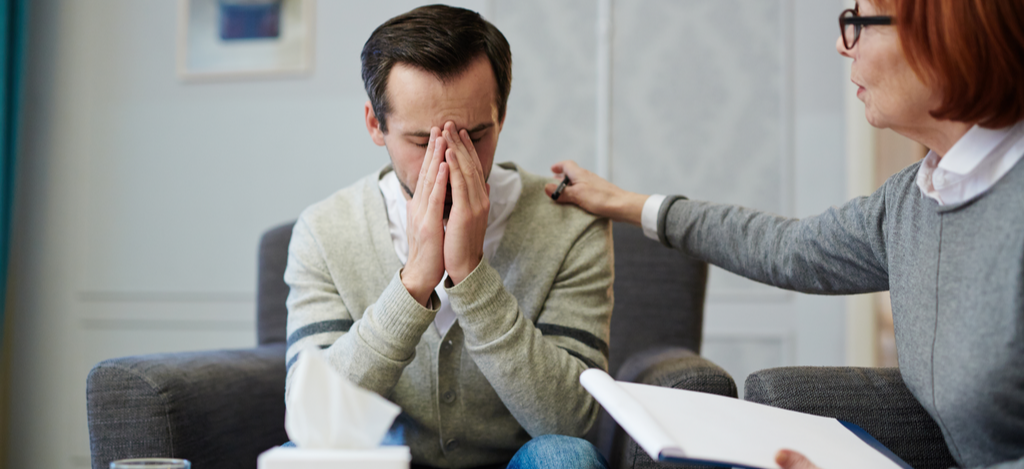Inpatient Treatment For Depression – How Mental Health Facilities Help Your Depression
The Importance of Inpatient Treatment For Depression
Table of Contents
When discussing depression, some people may think that this refers to feelings of just sadness or stress, such as those feelings that come with having a bad day. However, this mental condition is far more complex than this.
Individuals who are struggling with depression are often subject to experiencing severe psychological and physical symptoms, which can have a major impact on their lives and interpersonal relationships.
Furthermore, depression serves as an umbrella term for several disorders, rather than a singular mental illness. Doctors use this term to describe a group of mental health disorders known as depressive disorders.
When most people think of depression, they are referring to the disorder known as major depression. This is a severe condition that can easily disrupt your normal ability to function. However, other depressive disorders may include:
- Persistent depressive disorder (Dysthymia)
- Seasonal affective disorder (SAD)
- Postpartum depression
Each of these illnesses has its own characteristic side effects. For example, most of the time, dysthymia is not as severe as major depression. However, its symptoms will linger for at least two years.
Seasonal affective disorder, on the other hand, is linked to a lack of sunlight exposure, typically appearing in winter and fading as the days grow longer.
Finally, postpartum depression occurs in pregnant women, and (despite what the name may suggest) can either develop while still pregnant, or after giving birth. There are also depressive disorders with symptoms that you might associate with other mental illnesses, such as bipolar disorder or psychotic depression, which combines severe depressive characteristics with psychosis symptoms.

Depression Basics
Depression is an umbrella term, not a single illness. Doctors use this term to describe a group of mental health conditions called depressive disorders. When most people think of depression, they are referring to the disorder known as major depression. This is a severe condition that can easily disrupt your normal ability to function.
There are also depressive disorders with symptoms that you might associate with other mental illnesses. A big example here is bipolar disorder. This illness combines episodes of major depression with episodes of mania. Another condition, psychotic depression, combines severe depression with psychosis symptoms such as:
- Hallucinations
- Paranoid thinking
- Delusional thinking that centers on upsetting, false beliefs
Millions of Americans suffer from some kind of depressive disorder.
How Can You Tell If You Have Depression?
Everyone experiences feeling sad or overwhelmed at some point in their lives. So how can you tell whether you are just having a difficult time, or if you may be struggling with depression?
There are several symptoms associated with a depressive disorder, including:
- Feelings of immense sadness, misplaced guilt, or hopelessness.
- Feeling fatigued or experiencing a loss of energy or motivation.
- Experiencing bouts of anxiousness or irritability.
- Having problems sleeping, such as sleeping too much or too little.
- Inability to think clearly or remember things.
- Loss of interest in hobbies or activities that you previously enjoyed.
- Changes in your normal eating habits, such as eating more or less than usual.
- Experiencing unexplained physical issues such as head or body aches.
- Experiencing a decline in social activity or desire to maintain relationships.
If someone has several of these symptoms, and these last longer than 14 days, this may be a sign that they have diagnosable depression. However, those who only relate to a few of these characteristics, but which are actively impeding their life, may find that they have subsyndromal depression.
Individuals will need to consult with a psychiatrist or other mental health professionals in order to receive a proper diagnosis and begin seeking depression treatment.

What are the Methods of Treating Depression?
Perhaps one of the most widespread mental health conditions in the world, depression can touch every aspect of your life and lead to serious mental and physical changes. At its worst, this illness may even result in suicidal thoughts or attempts.
Fortunately, there are several treatment options available to those struggling with depression. These will usually focus on having the individual participate in therapy (or a combination of different therapies), and may include spending time at a depression treatment center.
Furthermore, when treating depression, a combination of medication and psychotherapy are usually the two front-line options in this process. This may include individual therapy, group therapy, and family therapy.
Additional therapies may include:
- Electroconvulsive Therapy. Electroconvulsive Therapy (ECT) is a procedure done under general anesthesia involving the passing of small electric currents through the brain. This triggers a brief seizure, which can cause changes in a person’s brain chemistry and potentially reverse the symptoms of certain mental illnesses.
- Eye Movement Desensitization. Eye Movement Desensitization and Reprocessing (EMDR) is a psychotherapy treatment designed to help process unresolved trauma through accessing stressful memories or other adverse life experiences and resolving them. This may also help relieve distress and help reformulate negative thought patterns.
- Cognitive Behavioral Therapy. Cognitive Behavioral Therapy (CBT) is a type of therapy designed to help people change their thought patterns, which can subsequently alter the emotions and behaviors these can cause.
- Dialectical Behavior Therapy. Dialectical behavioral therapy (DBT) is a type of CBT that can be used to treat suicidal or other self-destructive behaviors. The focus of this approach is to teach patients skills to better cope with negative thoughts and behaviors, subsequently facilitating healthy lifestyle changes.
For those with severe depression, treatment may involve participating in a residential treatment program. Inpatient depression treatment centers and the personalized care they can provide are often essential to effective depression treatment. A residential treatment center may offer important benefits that would otherwise be unavailable in outpatient care. By receiving the right kind of care, you significantly increase the odds of getting your depression under control and being able to return to a stable everyday routine.

Who Needs Inpatient Mental Health Facilities for Depression?
Who needs inpatient depression treatment? The most typical candidates are people with severe depression symptoms. That often includes people with untreated major depression, which is a severe illness.
However, even without severe symptoms, inpatient care may be right for you. Why? There are several reasons why you may need inpatient mental health facilities for adults near you. Such reasons include:
- Being affected by suicidal thoughts or attempting suicide
- Lack of the ability to function independently for whatever reason
- Trying and failing to recover in an outpatient program
- Not having a safe and secure home environment
- Lacking a solid personal support network
- Having substance problems in addition to depression
- Participating in cutting or other types of non-suicidal self-harm
You may also need inpatient treatment so doctors can observe you and make sound decisions about your future care.

DUAL DIAGNOSIS: SUBSTANCE ABUSE AND MENTAL DISORDERS
According to the Substance Abuse and Mental Health Services Administration (SAMSHA), many individuals struggle with simultaneous substance use and mental health disorders. These are known as co-occurring disorders or dual diagnoses.
In these cases, a person will usually develop an addiction after using drugs or alcohol in an attempt to self-medicate or regain control of their negative thoughts and feelings. Unfortunately, this relief is only temporary, and can actually make these difficult emotions worse over time.
When it comes to managing a co-occurring mental and substance use disorder, this will usually require a person to receive treatment at a residential addiction rehab facility that specializes in treating dual diagnosis clients.
HOW INPATIENT DEPRESSION TREATMENT CAN HELP YOU
Residential depression treatment centers offer many unique benefits that may not be included in other treatment approaches. While each person will require their own individualized treatment plan in overcoming their specific mental disorder, residential treatment facilities offer the most successful route to recovery.
SAFETY AND SECURITY
Everyone deserves to live in safety and security, including people recovering from depression. If you do not live in a stable environment, seeking out inpatient treatment may be particularly helpful in your attempts to recover from mental illness.
These facilities maintain secure and comfortable environments, and provide ongoing oversight of your health and well-being. This allows you to recover in a structured and tranquil setting, which is absolutely necessary when receiving treatment for depression.
This is especially important if you are struggling with thoughts of suicide or suicidal behaviors. In these circumstances, a residential treatment center will be able to provide life-saving supervision and interventive support.
SUFFICIENT TIME TO TREAT DEPRESSION
It takes time to recover from a mental disorder, especially in the case of depression. While an outpatient facility can be sufficient in treating less severe forms of depression, those suffering from more intense forms of this disorder may need to dedicate more time to recovering and getting healthy.
Thus, effective treatment for depression will often involve seeking out a residential rehab facility.

ACCESS TO TREATMENT RESOURCES
With the 24/7 care provided by a residential rehab facility, your treatment providers have more time to ensure you have access to in-depth treatment and recovery resources.
These will likely include therapy services, support groups, and the administration of medication to help battle the negative side effects of your depression.
IMPROVED SUPPORT
Lack of structure can be seriously destabilizing for people recovering from mental illness. This is particularly true for those whose family members or external support systems are actively contributing to this structural imbalance.
Thus, seeking help at a residential treatment center can be crucial to your ability to overcome depression. These facilities will have a network of readily-available treatment providers dedicated to providing a nurturing and stable environment for your recovery needs.
This may include family sessions as a part of your therapeutic treatment, which can help your friends and family better help you in leading a healthier life.
HELP TRANSITIONING TO OUTPATIENT CARE
When recovering from depression, Inpatient care is just one part of this process. Even after their more severe symptoms subside, most people will still need professional help in managing their mental disorder.
For this reason, it is common to transition from inpatient to outpatient treatment. While recovering at an inpatient depression treatment center, part of this process will include making this transition to outpatient treatment possible.

FINDING DEPRESSION TREATMENT CENTERS NEAR ME
In most parts of the country, there may be a decent amount of inpatient mental health facilities near or around your location. Some of these facilities will only treat people affected by non-substance-related issues, while others will offer treatment for addiction.
When searching for inpatient depression treatment centers, quality is just as important as quantity. Top facilities will offer mental health assessments as a part of their admissions process, which is designed to help determine the severity of your depression.
In addition, high-quality facilities may offer a more in-depth procedure called a psychiatric evaluation. This evaluation will provide more detail on the nature of your illness, as well as help create a personalized treatment plan for you.
Find Lasting Recovery from Depression with Emerald Isle Health
Facilities on your list of options should also offer expertise in effective depression treatment. In addition, your treatment plan should be customized and designed to fit your one-of-a-kind needs. Need more information on inpatient mental health facilities for depression?
Then contact one of our experts at Emerald Isle today. From mental health assessments to customized care plans, we offer a full slate of services. Let us help you recover from the impairing effects of your mental illness, and achieve a new beginning in life, depression-free.








